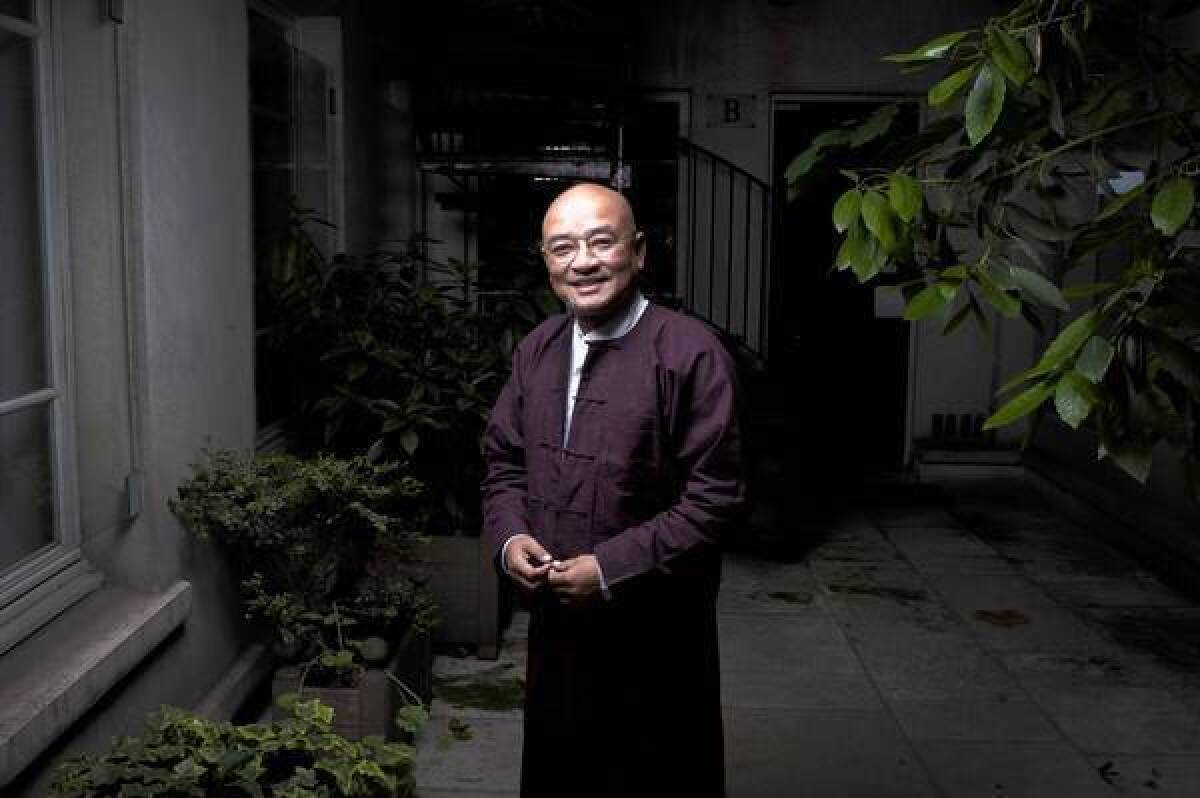In Myanmar, returning exiles show capacity for forgiveness

YANGON, Myanmar — Maung Thura, a comedian known as Zarganar, is a barrel of a man, stocky with a shaved head and a deep, forceful voice that seems out of place among the fluorescent lights and office furniture of the Home media group he recently helped found.
Zarganar’s biting wit and open criticism of repression in recent decades often irked Myanmar’s government, which jailed him for 11 years on such charges as “public order offenses,” including five spent in solitary confinement. In a joke the generals running the country didn’t find particularly funny, he told of a man who traveled to India for dental work and was asked why he didn’t see a dentist back home. The punch line: We have dentists in Myanmar, but no one’s allowed to open their mouths.
Released in 2011 under a general amnesty, Zarganar expresses little rancor for his former captors, including those in Myanmar’s civilian government prominent in the former military leadership.
“This is not a time for revenge,” he said. “Otherwise, it becomes a circular motion that never ends.”
Zarganar’s willingness to forgive — seemingly incomprehensible to many outsiders — if not always forget, is shared by thousands of dissidents and student leaders released from prisons or invited back to Myanmar, also known as Burma, after years in exile.
This flexibility on both sides offers hope the country can move more quickly toward national reconciliation, avoiding a settling of scores and crippling divisions seen in other countries struggling to emerge from decades of totalitarian rule.
“It’s amazing; I can’t fully understand it,” said Matt F. Smith, Southeast Asia researcher with Human Rights Watch. “It is definitely a fascinating phenomenon to see people back and showing no bitterness.”
Since elections in 2010, the government has eased media restrictions, allowed once-banned opposition parties to seek office and freed pro-democracy activist Aung San Suu Kyi from house arrest. She has become a lawmaker.
Skeptics are quick to point out, however, that the military still essentially controls the parliament and holds many key positions.
In 2011, Nobel Peace laureate Suu Kyi angered some in her own party with her willingness to work with President Thein Sein, an ex-general prominent in the former ruling clique. In September, Thein Sein told reporters in New York he’d accept Suu Kyi as president if she was elected. “We are now working together,” he said.
One explanation often given for this wary cooperation of former enemies after decades of repression and suffering is Buddhism, the religion followed by about 90% of Myanmar’s population, with its emphasis on tolerance and forgiveness.
Buddhism’s Theravada school followed here can be hard-line relative to the practice of Buddhism elsewhere: Buddhist monks here have led the campaign to deport Rohingya Muslims from western Myanmar, including some who have threatened to abandon their monasteries and join the army to “protect” the country by force if Muslims gain more rights. Even so, the religion has generally been seen as a calming influence.
“The Burmese are deeply religious,” said Morten Pedersen, senior lecturer with the Australian Defense Force Academy. “Sure, Buddhists are responsible for killing a lot of people, but you can’t just write off its importance.”
Other more practical factors may also be at work. Some say government opponents learned their lesson after 1990, when they won a multiparty election and couldn’t resist crowing, including a spokesman for Suu Kyi’s National League for Democracy party who suggested the generals might face a Nuremburg-style trial. Alarmed, the military refused to accept the results and instead instituted a massive crackdown.
Taking a slower, non-vindictive approach offers better odds that nascent reforms can take root, critics said, reducing the risk of a military backlash.
“If you fight directly against them, they’ll shoot. We tried that in 1988,” said Kyaw Yin Myint, editor of the Kumudra Journal in Yangon. “Sure, we’re angry inside, we’re humans. But you must be more clever.”
Since 2011, Myanmar officials, concerned about the lack of qualified teachers, entrepreneurs and other professionals needed to rebuild the country, have invited back millions of exiles. That includes activists previously on government blacklists. Negotiations are also underway to repatriate about 140,000 Burmese languishing in refugee camps on the Thai side of the border.
Even as Myanmar extends a hand to returnees, some wonder how willing it is to take advantage of their expertise.
“A taxi driver in New York may have more exposure than many here,” said Sein Win, chief editor of Mizzima news service, recently returned after 12 years abroad. “If the government is smart enough to use the capacity, it’s there. But I’m not sure they’ll listen.”
Sein Win said Myanmar’s understanding of how the world works is weak after years of isolation, but it’s often difficult to swallow pride. “My own experience, it’s best not to express your own opinion,” he said. “There’s a bit of xenophobia.”
Among those not in a particularly forgiving mood are Myanmar’s ethnic minorities, many of whom have waged armed struggles against the government for decades. Although the government recently signed cease-fire agreements with most of them, relations remain strained, distrust runs deep and social prejudice remains among majority Burmans, who make up about 70% of Myanmar’s population.
A Kachin woman living in Yangon working in publishing says she’s told, “Stop speaking that monkey language” by Burmese friends when she and other Kachin speak in their native tongue.
“People in the ethnic areas are justifiably upset,” said Smith, the researcher with Human Rights Watch.
Though there are many good things about forgiveness, some cautioned against taking it too far.
“Buddhism tends to forgive things,” said Suu Nget, a Mandalay-based writer blacklisted by the regime. “But if you get too cozy, you can forget your principles and become a traitor to your ideals.”
Magnier was recently on assignment in Yangon.
More to Read
Start your day right
Sign up for Essential California for news, features and recommendations from the L.A. Times and beyond in your inbox six days a week.
You may occasionally receive promotional content from the Los Angeles Times.






